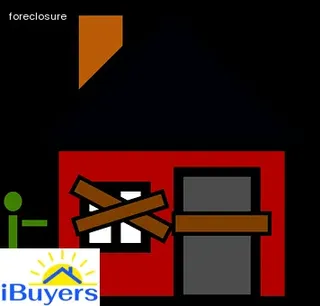Foreclosure laws and processes vary by state. In Texas, understanding the foreclosure process and the laws that govern it is important for anyone facing a foreclosure.
The length of time it takes to complete the foreclosure process in Texas depends on several factors such as the type of loan, whether or not the borrower has applied for a loan modification, and if all parties involved have completed all legal requirements. Generally speaking, foreclosures typically take between 90 days and one year to complete.
During this time, borrowers may be able to negotiate with their lender to modify their loan terms or avoid foreclosure altogether. If an agreement is reached, lenders must still complete all legal requirements before closing out the case.
If no agreement is reached, a foreclosure sale will occur after all required notices have been published for at least 20 days. After a successful sale occurs, any remaining debt on the property must be paid off before title can transfer over to the buyer's name.
It's important for homeowners who are facing foreclosure to explore their options with their lender in order to avoid having their home sold at auction.

In Texas, there are two primary types of foreclosure procedure: judicial and non-judicial. Judicial foreclosure is when the court is involved in the process.
This means that the lender must first file a lawsuit to obtain a court order granting them the right to foreclose on the property. Non-judicial foreclosure does not require court involvement.
Instead, it utilizes various legal documents to terminate the borrower's rights to their property without going through the courts. Both types of foreclosure procedures involve giving homeowners notice of their rights as well as providing them with an opportunity to cure any missed payments or other issues associated with their loan before actually initiating the foreclosure process.
Depending on which type of procedure is used, understanding how long it takes can vary significantly, so it’s important for homeowners in Texas to familiarize themselves with both and know what options they have when facing foreclosure.
Missing payments are the primary cause of foreclosure in Texas. When a homeowner fails to make a payment, they enter default status, which is the first step towards foreclosure.
The amount of time it takes for a home to go into foreclosure depends on how long past due payments remain unpaid. In Texas, lenders must wait at least twenty-one days after missed payments before starting the process of foreclosure.
During this time, the lender will usually contact the homeowner and offer options such as repayment plans or loan modifications that can help them avoid foreclosure. If these solutions are not successful and payments are still not made, then the lender may proceed with foreclosure proceedings.
Foreclosure can be avoided if homeowners work with their lenders to establish a suitable repayment plan or obtain loan modification assistance to get back on track with their mortgage payments.

If a homeowner in Texas is facing foreclosure, there are a few alternatives to consider before moving forward with the process. Homeowners should first reach out to their lender and explore any options for loan modification or repayment plans that could help make current mortgage payments more manageable.
Additionally, it may be beneficial to speak to a housing counselor or lawyer who can provide advice about other methods for avoiding foreclosure such as short sales, deed in lieu of foreclosure, and cash for keys agreements. All of these alternatives may be able to stop the foreclosure proceedings and allow homeowners the opportunity to stay in their homes.
It is important to remember that while some of these solutions may cost money or have other drawbacks, they are usually preferable than losing one's home through foreclosure. Taking the time to properly research all of the options available can help ensure that homeowners make an informed decision when it comes to avoiding foreclosure in Texas.
When facing foreclosure in Texas, understanding the law and process can be intimidating and overwhelming. However, there are a few key benefits to selling your home before it goes to auction that could be beneficial in the long run.
For starters, you have more control over the sale of your property as you are able to set a price that suits your budget. Additionally, it allows you to avoid the costs associated with an auction such as attorney's fees and other expenses.
Furthermore, selling prior to auction may be preferable for those who want to maintain their credit rating since foreclosure can significantly impact an individual’s credit score. Above all, by selling your property before it goes to auction, you can avoid having the home sold at an amount lower than what was originally owed on it which could result in a deficiency judgment from the lender if they deem that the sale did not cover all outstanding debts.
Selling before going through foreclosure is a smart move that could end up saving time and money in the long run.

When it comes to foreclosures in Texas, it's important to understand the timeline that is involved. On average, the total time for a foreclosure process in the state of Texas can range from 90-120 days.
The length of the process begins when a homeowner has become delinquent on their mortgage payments and the lender has initiated foreclosure proceedings. It typically takes 15-30 days for a lender to issue an official notice of default once they have determined that a homeowner is in arrears.
Once this notice has been delivered, the homeowner then has 20 days to settle their debt with the lender or face further legal action. After those 20 days have elapsed, the lender then has 30-45 days to file a lawsuit against the borrower and obtain an order of foreclosure from a judge.
Finally, after all paperwork has been submitted, it may still take up to 45 days before an auction is scheduled and held by the court. Understanding these timelines for foreclosures in Texas can help homeowners who are facing financial difficulties make better decisions about how best to address their situation.
When examining the stages of foreclosure in Texas, it is important to understand the process and how long each step can take. To begin, a Notice of Default is sent to the homeowner which notifies them that they have failed to fulfill their mortgage obligations.
This triggers a timeline set by the state, during which time the homeowner has an opportunity to cure the default. If this is not done before the deadline, then a Notice of Sale will be filed with the county clerk's office and published in a local newspaper.
The home will then be auctioned off and if no bids are received, ownership will revert back to the lender. After this point, an eviction order may be issued if the homeowner still resides in the property.
The entire process from beginning to end can range from three months up to six months depending on various factors such as court hearings or pending negotiations between all parties involved.

A Notice of Default is an official document that mortgage lenders must file with the county court in order to initiate the foreclosure process in Texas. The Notice of Default informs the homeowner that they are in default on their mortgage payments and provides a timeline for them to make up any past due payments.
It is important to understand this document as it marks the beginning of foreclosure proceedings, which can have a significant effect on credit scores and other financial obligations. After receiving a Notice of Default, homeowners should be aware that they may be subject to additional fees or penalties if they are unable to make up their delinquent payments within the specified time frame.
Understanding how long it takes for foreclosure proceedings to take place after a Notice of Default has been filed is key for homeowners looking to protect their rights and finances during this difficult time.
A Notice of Sale is a required legal document that must be sent to the homeowner in Texas when foreclosure proceedings have commenced. It serves as an official notice informing the homeowner that their property is in danger of being sold at a public auction if they are unable to pay off their outstanding debt.
The Notice of Sale outlines the details of the foreclosure proceedings, including the date and time of the public auction and any applicable deadlines. It must also include contact information for both the lender and their attorney so that the homeowner can seek legal advice or negotiate with the lender before the sale occurs.
In addition, it will state how long before the public sale will take place and any other relevant information that may help homeowners understand their rights during this process.

When facing foreclosure in Texas, many homeowners look for ways to stop or delay the process. While there are no guarantees of success, a few possible solutions could come into play depending on the individual's circumstances.
Understanding the different state foreclosure laws and processes can be key to finding a viable solution. There are various strategies that may help prevent a home from going into foreclosure including negotiating an agreement with the lender, applying for a loan modification or refinance, or filing for bankruptcy protection.
In some cases, homeowners may even be able to submit an appeal to have the sale of their home postponed. By better understanding how long it takes to go through the foreclosure process in Texas and exploring potential solutions, homeowners may be able to find relief from their financial struggles.
Foreclosing on your home can have serious financial consequences, and understanding them before taking this step is important. In Texas, the foreclosure process begins with a notice of default being sent to the homeowner by the lender.
The homeowner then has 20 days to pay off their debt or resolve any other issue causing them to fall behind on payments. If the debt cannot be paid off in that timeframe, a foreclosure sale is scheduled.
Although the timeline for foreclosures in Texas can vary due to many factors, typically it takes around two months from start to finish. During this time, homeowners may be responsible for paying back taxes, legal fees, and other costs associated with the foreclosure.
These costs can add up quickly and should be taken into account when considering whether or not to pursue foreclosure. Homeowners who are unable to pay these costs may end up losing their home and suffering other long-term financial implications as well.
Understanding all of these potential consequences before going through with a foreclosure is key.

The length of time it takes for a foreclosure process in Texas to be completed varies based on multiple factors. One significant factor is the lender's methodology, specifically if they choose to pursue a judicial or non-judicial foreclosure.
Judicial foreclosures take longer due to the involvement of the court system and its respective timelines, while non-judicial foreclosures are often quicker as they typically do not involve any court proceedings. Additionally, whether a homeowner contests the foreclosure or not will also affect the timeline; a challenge may lead to further delays that can add weeks or months onto the length of time it takes.
Another variable affecting the timeline is how quickly lenders move through their respective processes such as property inspections and paperwork filing. Lastly, if there is an auction scheduled for a property, that too can influence how long it takes for a foreclosure process to be completed in Texas.
Foreclosure proceedings can be complex and intimidating, which is why seeking legal assistance is highly recommended. Depending on the type of foreclosure, the laws and procedures in Texas vary greatly.
As such, having access to legal advice from an attorney who understands the specific laws and regulations related to your case is invaluable. In addition to providing legal guidance during the process, a lawyer may also be able to negotiate with lenders or provide other solutions that could help protect you from foreclosure.
It’s important to note that legal help should be sought as soon as possible after being served with a foreclosure notice in order to maximize the chances of a successful outcome. While there are several avenues for finding legal assistance for foreclosures in Texas, including local bar associations and other organizations offering low-cost or pro-bono services, hiring an experienced attorney who specializes in foreclosure law can provide peace of mind and ensure you have someone experienced advocating on your behalf throughout the entire procedure.

Once the Notice of Sale has been posted in Texas, the next step in the foreclosure process is for the property to go to auction. Because Texas law requires lenders to post their notice of sale at least 21 days prior to auction, buyers should have plenty of time to prepare.
The actual auction is conducted by a third-party and must be conducted between 10:00am and 4:00pm on the first Tuesday of any given month. If bidding fails to reach the minimum amount owed by the borrower, then a second auction will take place during the same hours two weeks later.
If this second attempt also fails, then the lender may repossess or buy back the property at a designated price. After either successful bid is accepted by all parties involved, documents are filed with County Clerks office and typically take 60-90 days before they are finalized.
During this time period, all terms of sale must be followed - including payment in full - or else the buyer could face serious consequences from lenders or courts. All in all, it generally takes three months for a foreclosure process to be completed after postings begin in Texas.
When facing foreclosure, some homeowners may be tempted to refinance their mortgage to avoid or delay the process. Refinancing your home can help in some cases, as it allows you to pay a lower interest rate and potentially extend the repayment period.
However, refinancing could also result in higher monthly payments or additional fees, depending on the type of loan you choose. For this reason, it's important to understand all aspects of refinancing before making a decision and consult with a financial advisor if necessary.
Additionally, not all lenders are willing to refinance a home that is already in foreclosure; therefore, it's important to speak with your lender and clarify their policies before attempting this approach. Ultimately, refinancing may be beneficial for those facing foreclosure in Texas but should only be done after careful consideration of all potential outcomes.
In Texas, a homeowner who fails to make their mortgage payments will begin the foreclosure process after failing to pay for at least 30 days. The lender can then file a Notice of Default and, if no payment is made within 20 days, the lender can move forward with the foreclosure process.
From filing the notice of default until it is finalized in court, it typically takes between three and six months for a foreclosure to be complete. During this time, homeowners may be able to work out other solutions with their lenders such as loan modifications or repayment plans.
It’s important for homeowners in Texas to understand their rights and obligations under the state’s foreclosure laws in order to protect themselves from unnecessary delays or financial hardship.

In Texas, the length of time it takes for a house to be foreclosed varies depending on the type of loan and foreclosure process used. Generally, the entire foreclosure process can take anywhere from two months to one year. In order to understand how long a foreclosure will take in Texas, one must understand the different types of loans and foreclosure processes available.
The two most common types of loans are traditional mortgages and home equity conversion mortgages (HECMs). Traditional mortgages involve a lender making direct payments to a borrower as part of an agreement. In contrast, HECMs involve taking out a loan against the value of one’s home.
The type of loan affects which foreclosure process is used in Texas. If traditional mortgages are involved, then a judicial foreclosure is typically used. This is when a lender files a case in court and receives permission from judges to foreclose on the home if payments are not made on time.
Judicial foreclosures can take anywhere from 90 days up to 4-6 months or longer depending on how backed up courts get with cases. If HECMs are involved then nonjudicial foreclosures may be used instead which generally move much faster than judicial ones. Nonjudicial foreclosures do not require court involvement and take approximately two months to complete once initiated by lenders.
Overall, understanding how long it takes for a house to be foreclosed in Texas depends on the type of loan and foreclosure process used. Traditional mortgage loans that go through judicial foreclosure can take anywhere from 90 days up to 4-6 months or longer while HECM loans that go through nonjudicial foreclosure only take around two months total once initiated by lenders.
Texas' most common foreclosure process is called judicial foreclosure. This involves the court system and occurs when a lender files a lawsuit against the homeowner for failing to make mortgage payments.
The court then issues a judgment of foreclosure, which allows the lender to repossess the property. The entire process typically takes 3-6 months from start to finish, depending on local court backlogs and other factors.
During this time, homeowners have an opportunity to contest their foreclosure and may be able to negotiate with their lender or apply for loan modification programs in order to avoid losing their home. It's important for Texas homeowners facing foreclosure to understand their rights under state law and take the necessary steps to protect their home if possible.
Stopping a foreclosure in Texas can be a difficult process, but it is possible. There are several options available to homeowners facing foreclosure in the state, including working with lenders to renegotiate loan terms and setting up a repayment plan.
Additionally, Texans who are unable to make their mortgage payments may qualify for government assistance or loan modification programs that could help them avoid foreclosure. Homeowners should also consider filing for bankruptcy, which would stop the foreclosure process and give them time to work out an arrangement with their lender.
Finally, homeowners can take advantage of Texas' homestead law, which protects certain types of assets from seizure during a foreclosure proceeding. By understanding the laws and processes associated with foreclosure in Texas and seeking out any available assistance, homeowners may be able to prevent or delay the loss of their home.